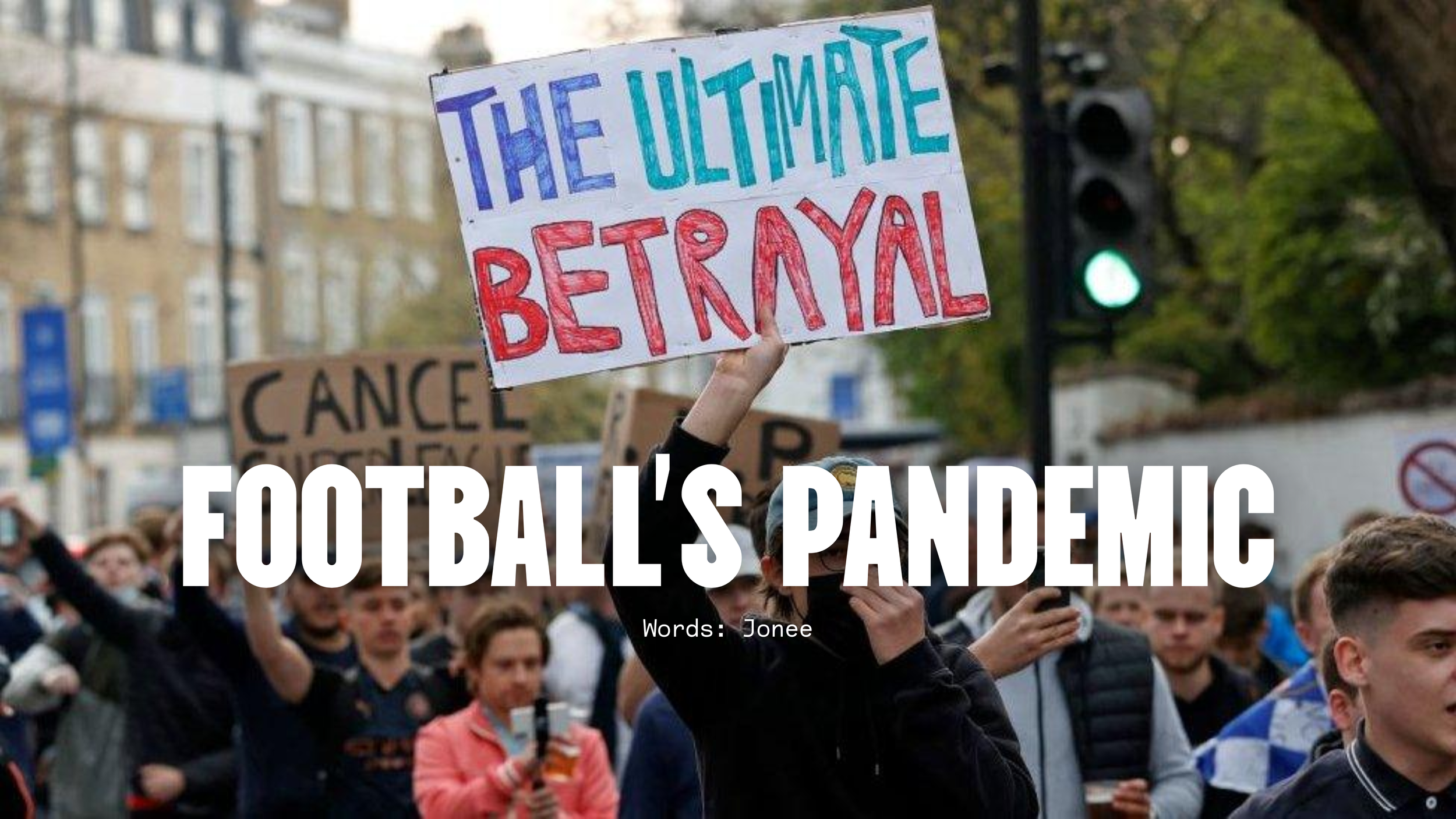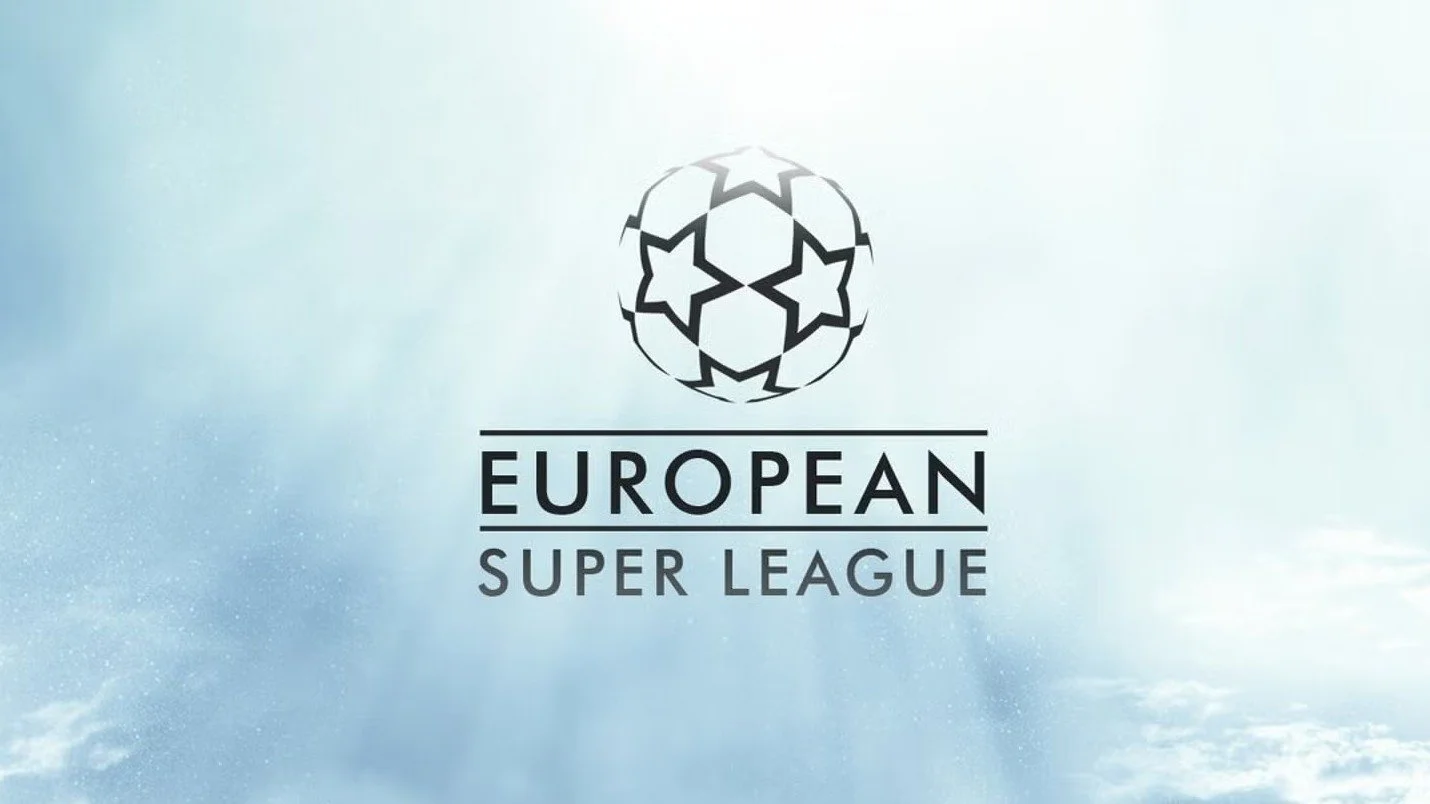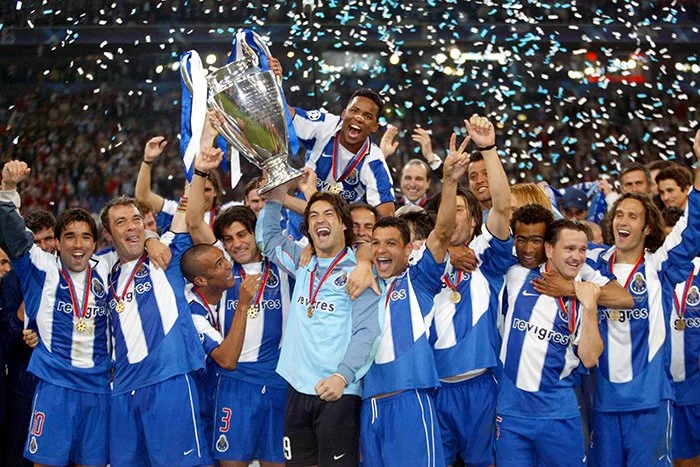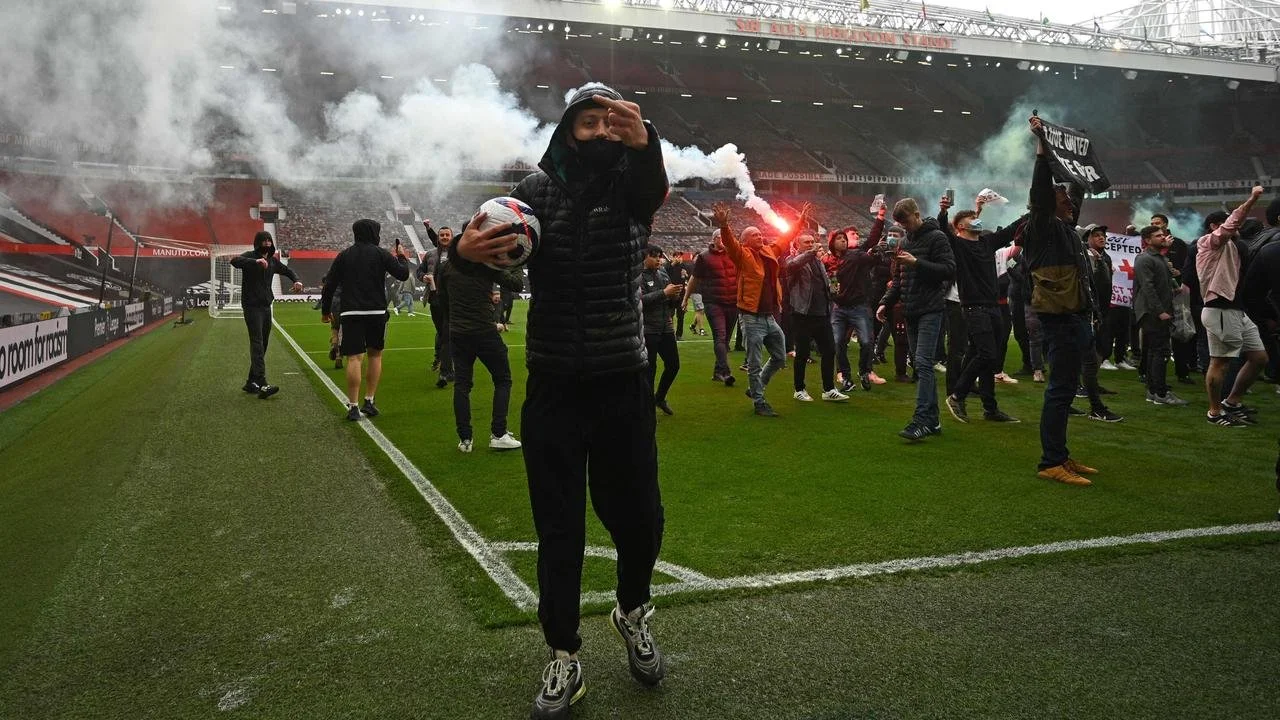
Words by Jonee | Published 14.05.2025In early 2021, while the world grappled with a relentless global pandemic, football fans faced a different kind of crisis: the audacious proposal for a European Super League. Spearheaded by some of Europe’s most powerful clubs, this project threatened to upend the cherished heritage of our beautiful game. For many of us, the Super League wasn’t just a business venture—it was a monstrous betrayal of football’s soul, sparking a fierce backlash from supporters, pundits and clubs alike.
Football can often be neatly divided into two competing camps: the passionate supporters who live for the game and the financial interests vying for its control. In this tug-of-war, fans are steadily losing ground. Some argue this shift is inevitable in a globalised world, while others fiercely resist the erosion of football’s purpose and meanig. Regardless of where you stand, the game has never felt more distant from its roots than it does today. So, it was hardly surprising when, in 2021, football’s wealthiest clubs launched a brazen attempt to impose a European Super League, largely driven by greed. This move came close to severing the profound bond between supporters, clubs, and the regions and cities where they are rooted.
Supporting a football club means embracing a profound connection to an entity—a place, a shirt, and decades of rich history that predate us and will outlive us all. It’s a bond we accept with open arms, often unable to fully explain its origins, yet it shapes who we are, how we think, and how we see the world. It is a complex relationship. This deep-rooted passion is something today’s football owners often fail to grasp. Their connection to our game, driven by profit, stands in stark contrast to the devotion we show to our clubs, occupying the furthest possible point from our own.
Big Money often believes it can do whatever it pleases. After all, that’s typically what happens. Given their deep involvement in the world of football, it’s understandable why they might see the sport as just another playground for the rich and powerful to vie for control and stroke their egos. But football has a unique twist: although we, the supporters, don’t own the clubs, the federations, or the institutions that govern the game, we own the essence of football itself. The game belongs to us, crafted for us. The duty of protecting it falls on our shoulders. This is a responsibility we embraced when we fell in love with the sport, and we carry it with pride.
The game rests in our hands. We must fight for it every day. In the grand scheme of things, football may not seem vital, but it’s woven into our souls. It captures a piece of who we are. We laugh and cry with it; we live and ‘die’ for this game of ours.
Unlike many, I don’t begrudge the vast sums of money swirling around football today. How could the world’s most popular sport remain untouched by the financial elite? It simply couldn’t. Yes, the transfer fees are astronomical, clubs pay exorbitant wages, and excesses abound, but this was inevitable.
What truly breaks my heart is how club owners have forgotten us, the supporters, and how players have lost sight of who they truly play for. This is the dark side of our game—a betrayal of its soul. It’s against this erosion of connection that we must fight back.
Chelsea fans protest against the Super League in 2021.
Photo Credit: BBCThe Super League project was a controversial proposal by twelve of Europe’s wealthiest football clubs to create a new, semi-closed elite competition to replace the UEFA Champions League. The idea was driven by a desire to maximize revenue, secure greater control over broadcasting rights, and guarantee participation for top clubs, regardless of their domestic league performance. The founding clubs—six from England (Manchester United, Manchester City, Liverpool, Chelsea, Arsenal, Tottenham), three from Spain (Real Madrid, Barcelona, Atlético Madrid), and three from Italy (Juventus, AC Milan, Inter Milan)—envisioned a 20-team league with 15 permanent members and five qualifying spots, promising high-profile matches and increased financial returns.
The motivation behind the Super League stemmed from the financial pressures facing elite clubs, exacerbated by the COVID-19 pandemic, which slashed match day and broadcasting revenues. These clubs, burdened by high wages, transfer fees, and debts, saw the Champions League’s revenue distribution as insufficient and its qualification system as too uncertain. The Super League guaranteed annual participation for its founders, ensuring consistent income from lucrative TV deals and sponsorships. Proponents, led by figures like Real Madrid president Florentino Pérez and Juventus chairman Andrea Agnelli, argued it would “save football” by delivering more frequent, high-stakes matches between global brands, appealing to younger audiences and international markets.
The structure proposed a midweek competition with two groups of ten teams, leading to a knockout phase, running parallel to domestic leagues. The clubs claimed this would generate more revenue for the entire football pyramid, though critics saw it as a cash grab prioritizing the elite. The Super League’s closed format, shielding founders from relegation, was a sharp departure from European football’s meritocratic tradition, where qualification is earned through performance.
At best, the proposal from the twelve founding clubs was arrogant. At worst, it was a betrayal of their supporters.
The Super League was a brazen move born of entitlement, as if these clubs believed they could rewrite football’s purpose to suit their needs. They saw themselves as too big to fail, their matches too thrilling to need the unpredictability of merit-based qualification. But the backlash brought them crashing back down to earth quickly: fans, especially in England, roared back, reminding them that their financial might doesn’t grant immunity from tradition or loyalty.
Ultimately, the Super League project was driven by greed. The twelve founding clubs can count themselves as part of Europe’s football elite, and while their success on the pitch is legendary, it often masks a deeper financial malaise which exists among the top echelons of football. The only way to continue chasing this success is to spend more. The Super League was a way to enable that.
What is surprising is that these owners failed to anticipate such a fierce backlash from the very supporters who have lined their pockets for decades with unwavering loyalty. Have they taken heed? I’d like to believe so, but I suspect they haven’t.
Proposed branding for the European Super League.
Photo Credit: SportcalAs a devoted Champions League aficionado, I must confess it forms the backbone of my football experience, alongside a handful of other competitions. It’s the Holy Grail of football for me. Every player, manager, supporter, and casual fan dreams fervently of lifting that iconic trophy. As UEFA’s crown jewel, it’s also their most lucrative venture, with substantial prize money distributed at every stage. Does it include too many ‘non-champions’? Undoubtedly. Is it a playground for the rich and powerful? Absolutely. Does it need an overhaul? Certainly. But these flaws don’t justify discarding it or replacing it with a monstrosity like the Super League, where footballing merit is rendered irrelevant.
The Champions League already tilts heavily in favour of the elite. It’s been 21 years since a ‘non-giant’ last won it—FC Porto’s unforgettable triumph in 2004. Big clubs dominate, and while this imbalance has intensified over the past two decades, it’s always been part of the competition’s fabric. That’s not to say it’s ideal, but it’s a reality we’ve accepted.
The 12 clubs behind the Super League proposal craved more money—money they claim the Champions League no longer provides. They’re right that UEFA could likely unlock greater revenue from its competitions, but this should be a discussion involving all stakeholders, not just the elite. Even without those 12 clubs, European football would still deliver a compelling Champions League each season.
UEFA competitions have evolved over the years—some trophies discontinued, others rebranded—but the emotions they stir remain unchanged. We still cherish that unforgettable cup run our club had in a distant season, as if it marked the pinnacle of their achievements. And perhaps it did. Most of us have mentally compared our club’s epic European adventure in some cherished year to another club’s run, and somehow, ours always feels superior. It’s amusing how football weaves itself into our minds, binding us to those moments of glory.
Everyone wants more money, including UEFA, which is far from blameless in the greed permeating modern football. That’s a reality we must accept as a permanent feature of our beautiful game, but there are ways to keep all stakeholders happier. Increase prize money across UEFA competitions, elevate the stature of the Europa League and Conference League, and, if I may suggest, launch summer tournaments sponsored by UEFA. Invite clubs to compete for substantial prizes, capitalising on our collective desire for high-level football. Maximise the calendar to create more opportunities. Celebrate UEFA’s rich history with matches between former cup winners, even if only for bragging rights. At the same time, open doors for grassroots trophies, enabling smaller clubs to carve out their own slice of European history.
Football boasts a truly global following unmatched by any other sport, yet this potential remains underutilised. Too often, clubs are left to fend for themselves when a supportive structure could uplift those in need. But I digress—that’s a discussion for another time.
Porto celebrate winning the Champions League in 2004.
Photo Credit: PlanetFootballWithin days, if not hours, of the Super League proposal making headline news, fans across Europe rose in a wave of fury, their protests shattering the Super League’s foundations and proving that football belongs to us, not them.
The announcement landed like a grenade. Fans, already battered by a pandemic that kept them from stadiums, were blindsided by their clubs’ betrayal. The Super League’s ‘closed shop’ model mocked the very essence of football. It wasn’t about competition, it was about cash, a scheme to funnel billions to the elite while leaving the rest of the pyramid to wither. Supporters saw through the glossy promises of ‘saving football’ peddled by Real Madrid’s Florentino Pérez. They knew it was a heist, stealing the game’s heart to line the pockets of owners like the Glazers, Stan Kroenke, and Roman Abramovich.
On 19 April, Leeds United fans, joined by Liverpool supporters, gathered outside Elland Road before a Premier League clash. Banners read “Say No to Super League,” and a plane flew overhead trailing a message: “#saynotosuperleague.” Leeds players warmed up in T-shirts emblazoned with “Earn It” and “Football is for the Fans,” joining their supporters in solidarity. Liverpool’s fan group Spion Kop 1906 announced they’d remove their iconic flags from The Kop, declaring, “We feel we can no longer give our support to a club which puts financial greed above integrity of the game.” At Anfield, banners mourned “LFC RIP – 1892-2021” and demanded the exit of Fenway Sports Group, Liverpool’s owners.
The next day, the rebellion swelled. Over 1,000 Chelsea fans descended on Stamford Bridge before a match against Brighton, blocking traffic on Fulham Road and delaying kick-off by 15 minutes. Signs ranged from furious—“Football belongs to us not you”—to poignantly comic: “We want our cold nights in Stoke.” The Chelsea Supporters’ Trust branded the move “the ultimate betrayal,” a sentiment echoed by Arsenal’s Supporters’ Trust, which called it “the death of everything football should be about.” Manchester United fans unfurled banners at Old Trafford reading “Created by the poor, stolen by the rich,” while Tottenham supporters protested at their training ground with placards urging, “Say No to Super League.” Even Manchester City’s official supporters’ club condemned the plan as “motivated by greed,” uniting with rivals in a rare show of solidarity.
The protests had teeth. Chelsea fans threatened to boycott season tickets, and Arsenal’s supporters planned peaceful demonstrations ahead of their match against Everton. By Tuesday afternoon, as Chelsea fans chanted for Abramovich to “do the right thing,” news broke that Chelsea and Manchester City were wavering. By evening, all six English clubs had pulled out, collapsing the Super League within 48 hours.On 22 April, Manchester United fans stormed the club’s Carrington training groundwith banners reading “Glazers out” and “We decide when you play.” On 2 May, thousands of United supporters invaded Old Trafford, postponing a match against Liverpool—the first Premier League game ever halted by a protest.
This wasn’t just about the Super League; it was about reclaiming football from those who see fans as “legacy” consumers rather than the game’s lifeblood. Gary Neville’s televised rant—“It’s a criminal act against football fans”—became a rallying cry, while Pep Guardiola lamented, “It’s not a sport when it doesn’t matter whether you lose.” Players, too, joined the chorus. Leeds’ Patrick Bamford noted, “I haven’t seen one football fan who’s happy about the decision… football ultimately is for the fans.” The government, sensing the public mood, promised a “legislative bomb” and launched a fan-led review, later paving the way for an independent regulator to block future breakaways.
Yet, the victory was bittersweet. The Super League’s collapse didn’t erase the greed that birthed it. Court rulings, like the 2023 European Court of Justice decision against UEFA’s monopoly, have kept the project twitching, with clubs like Real Madrid and Barcelona still pushing. Most English clubs have publicly distanced themselves, but money talks, and whispers of a UEFA-backed variant linger. Fans must stay sharp, as I’ve said before, because this beast will rear its ugly head again. The 2021 protests showed our power—Chelsea fans halting traffic, Liverpool’s Kop baring its soul, United supporters storming pitches—but they also exposed how fragile football’s traditions are.
I cherish football’s history, its tales of giants and minnows battling for glory. But I want every spot earned, every match a test of will. The Super League mocked that, offering a sterile parade of elite fixtures with no stakes. Fans rejected it because, despite its flaws, this is our game. The protests were a reminder that football fans can’t be bought or steamrolled.
The protest and pitch invasion at Manchester United following the announcement of the Super League.
Photo Credit: The AustralianFootball, like any sport, thrives on merit—on winning and losing. Yet, society often struggles with the reality that not everyone can be a winner. No matter how many ribbons we award for second or tenth place, the truth remains: in every sport, someone must win, and others must lose. I want football competitions to reflect that reality. No club, no matter how successful, should be granted a permanent seat in any competition, national or international. You must play to win; you must win to belong. This is a hill I’m willing to die on. Yes, clubs like Real Madrid, Bayern Munich, or AC Milan boast pedigrees that set them apart, and their history should be celebrated and respected. But it must never guarantee a place in any tournament.
The Super League project is far from dead. Ongoing court battles, with several rulings favouring its proponents, show it’s an idea still very much alive. Have most of the clubs backed down? Absolutely—at least publicly. But money is a powerful motivator, and these club crave it. At some point, this project—or a similar one—will resurface, rearing its ugly head. Whether we like it or not, it may even emerge with UEFA’s backing. Fans must stay vigilant, keeping our voices sharp and our wits ready for the fight. We must save our game from those who would exploit it and our clubs from their own greed. That day is coming—make no mistake.
You can make the argument that the Super League - or a precursor to it - is already here, in the form of the new Champions League format. Introduced at the beginning of the 2024/25 season, this new format will see 36 teams compete in a league table, with each club playing 8 other teams. The same format was rolled out for the Europa League and UEFA Conference League. Time will tell if this formulates into anything resembling the 2021 Super League proposal, but until it does, fan groups need to be on their toes and ready for the coming fight.






